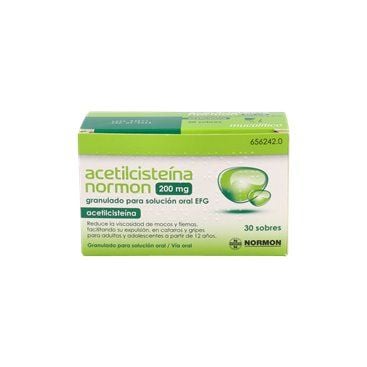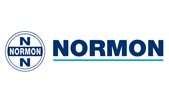Normofludil/Acetylcysteine Normon 200Mg Efc 30 Sachets
Acetylcysteine, the active ingredient in this medicine, belongs to a group of medicines called mucolytics, which act by reducing the viscosity of mucus, making it thinner and facilitating its elimination.
This medicine is indicated to facilitate the elimination of excess mucus and phlegm, in colds and flu, for adults.
Acetylcysteine, the active ingredient in this medicine, belongs to a group of medicines called mucolytics, which act by reducing the viscosity of mucus, making it thinner and facilitating its elimination.
This medicine is indicated to facilitate the elimination of excess mucus and phlegm, in colds and flu, for adults.
Normofludil Efg (200 Mg 30 Envelopes Granules For Oral Solution)
Acetylcysteine
ACTION AND MECHANISM
- [MUCOLYTIC]. It is the N-acetylated derivative of the natural amino acid cysteine. It reduces the viscosity of bronchial secretions, favoring their elimination, probably due to the presence of a free thiol group. This group is capable of breaking the disulfide bridges that maintain the three-dimensional structure of mucoproteins, which leads to fluidization of the secretion. Its effects are pH-dependent, being maximum at pH between 7-9.
PHARMACOKINETICS
- Absorption: After oral administration of a 200-600 mg dose, it is rapidly absorbed, reaching a Cmax of 0.35-4 mcg / ml after 0.5-1 hours. Its bioavailability is very low (4-10%), probably due to an intense intestinal and first-pass liver metabolism.
- Distribution: Circulates in plasma both in free form and bound to proteins (50%) by labile disulfide bridges or peptide covalent bonds. It is widely diffused by extracellular fluids, mainly located in bronchial secretion. Your Vd is 0.33-0.47 l / kg.
- Metabolism: It undergoes an intense intestinal and hepatic metabolism, giving rise to sulfur derivatives such as cysteine, N-acetylcystine, N, N-acetylcystine or glutathione.
- Elimination: Acetylcysteine is eliminated by metabolism (70%) and subsequent excretion in urine, in free form (30%) or metabolites. Its elimination half-life is 6.25 hours (oral) or 5.58 hours (intravenous).
Pharmacokinetics in special situations:
- Children: After intravenous administration, elimination half-life values of 11 hours have been found.
- Hepatic insufficiency: The elimination half-life is increased by 80% in patients with severe hepatic insufficiency or with primary or secondary biliary cirrhosis.
INDICATIONS
- [BRONCHIAL HYPERVISCOSITY].
* Adjuvant treatment in respiratory processes that present with excessive or thick mucous secretion, such as [ACUTE BRONCHITIS] or [CHRONIC BRONCHITIS], [PULMONARY EMPHYSEMA], [ATHELECTASIA] due to mucosal obstruction, pulmonary complications of [CYSTIC FIBROSIS] and other pathologies related.
POSOLOGY
"ORAL ADMINISTRATION"
- Adults and children over 7 years: 200 mg / 8 h or 600 mg / 24 h in a single dose.
* Cystic fibrosis: 200-400 mg / 8 h.
- Children 2-7 years: 100 mg / 8 h or 300 mg / 24 h in a single dose.
* Cystic fibrosis: 200 mg / 8 h.
- Children <2 years: safety and efficacy have not been evaluated.
Missed dose: take as soon as possible if a short time has elapsed. Otherwise, skip the dose. Do not double the dose in the next administration.
RULES FOR CORRECT ADMINISTRATION
Administration with food : It is recommended to take acetylcysteine with food. In case of administration in a single dose, it is advisable to do it in the morning.
- Envelopes: dissolve the contents of the envelope in a glass of water, then drink.
CONTRAINDICATIONS
- Hypersensitivity to acetylcysteine or any other component of the drug.
PRECAUTIONS
- [HEPATIC INSUFFICIENCY] severe, [HEPATIC CIRRHOSIS]. In these patients, clearance may be decreased, with the consequent greater risk of adverse reactions, therefore it is recommended to closely monitor the patient for the risk of anaphylactic adverse reactions.
- [PEPTIC ULCER]. Acetylcysteine can sometimes lead to nausea and vomiting, especially at high doses, thereby increasing the risk of gastric bleeding. In addition, it has also been postulated that acetylcysteine produces an increase in gastric mucus fluidity, leading to a decrease in its protective action. Extreme caution is recommended in patients with peptic ulcer.
- [ASTHMA]. In asthmatic patients, with severe [RESPIRATORY INSUFFICIENCY], or in those with conditions associated with [BRONCHIAL SPASM], increased fluidity of secretions may lead to airway obstruction if expectoration is not adequate. Therefore, extreme precautions are recommended.
- Increased expectoration. At the beginning of treatment, an increase in expectoration may appear, due to the increased fluidity of the secretions. This effect diminishes after several days of treatment. If symptoms persist or worsen after five days of treatment, it is advisable to re-evaluate the clinical situation.
PRECAUTIONS RELATING TO EXCIPIENTS
- This medicine contains sorbitol. Patients with hereditary [FRUCTOSE INTOLERANCE] should not take this medicine.
- This medicine contains yellow orange S as an excipient. May cause allergic-type reactions including [ASTHMA], especially in patients with [SALICYLATE ALLERGY].
- This medicine contains aspartame as an excipient, so it should be taken into account by people affected by [PHENYLKETONURIA]. 100 mg of aspartame correspond to 56.13 mg of phenylalanine.
ADVICE TO THE PATIENT
- It is recommended to drink a large quantity of water during the treatment.
- The preparation may have a slight sulfuric odor, characteristic of the active principle and not of an alteration of the preparation.
- The doctor should be warned if a generalized itching appears throughout the body.
- If after five days, the symptoms continue or worsen, it is advisable to see a doctor.
INTERACTIONS
- Antibiotics. Acetylcysteine may be incompatible with amphotericin B, ampicillin sodium, cephalosporins, erythromycin lactobionate, or some tetracyclines. It is recommended to separate the shots at least an interval of two hours.
- Antitussives. Acetylcysteine increases the fluidity of bronchial secretions, so it is not advisable to administer it together with antitussives, which could inhibit the cough reflex and lead to pulmonary obstruction.
- Bronchial secretion inhibitor drugs (anticholinergics, tricyclic antidepressants, H1 antihistamines, antiparkinsons, MAOIs, neuroleptics). They can antagonize the effects of acetylcysteine.
- Nitroglycerin. Acetylcysteine could potentiate the vasodilator effects of nitroglycerin and its adverse reactions at very high doses (100 mg / kg).
- Metal salts. Acetylcysteine could present certain chelating effects of some metals such as gold, calcium or iron, thus reducing its absorption. It is recommended to distance the taking of mineral supplements and acetylcysteine at least two hours.
PREGNANCY
FDA Category B. The administration of doses of 500 mg / kg / 24 hours orally, or a nebulization of acetylcysteine and isoprotenerol for 30-35 minutes in pregnant rabbits did not show teratogenicity. The peri and postnatal studies also failed to uncover evidence of fetal or newborn harm. Acetylcysteine appears to cross the placental barrier. Adequate and well-controlled studies have not been carried out in humans, so the use of this medicine is only accepted in the absence of safer therapeutic alternatives.
LACTATION
It is not known whether acetylcysteine is excreted in milk, and whether this could affect the child. It is recommended to stop breastfeeding or avoid the administration of this medicine.
KIDS
No specific problems have been described in this age group. Accepted use.
SENIORS
No specific problems have been described in this age group. However, in these patients, the presence of hepatic or respiratory failure is usually more common, so it is recommended to use acetylcysteine with caution.
EFFECTS ON DRIVING
Acetylcysteine does not usually cause drowsiness, but exceptionally some cases have been described. Caution is recommended when driving, until it is relatively certain that the treatment does not adversely affect the patient's ability.
ADVERSE REACTIONS
Adverse reactions to acetylcysteine are rare, mild, and transient. The most common adverse reactions are:
- Digestive. Sometimes [NAUSEA], [VOMITING], [DIARRHEA] and [GASTRIC HYPERACIDEZ] may appear, especially when it is used at high doses.
- Hepatic. Some cases of [TRANSAMINASE INCREASE] have been reported after administration of large doses of acetylcysteine, which reversed after a few days of stopping treatment.
- Neurological / psychological. Some cases of [HEADACHE], [Drowsiness] have been described.
- Respiratory. They are usually exclusive to administration by inhalation. [RINORRHEA], [BRONCHITIS], [TRACHEITIS], [HEMOPTISIS] and [BRONCHIAL SPASM] may appear.
- Eyepieces. [BLURRY VISION].
- Ear and labyrinth disorders: [TINNITUS].
- Allergic / dermatological. After 30-60 minutes of administration, [HYPERSENSITIVITY REACTIONS] may occur, presenting with generalized [URTICARIA], [FEVER] moderate, [EXANTEMATIC ERUPTIONS], [PRURIT], [ANGIOEDEMA], [DYSNEA] and [ HYPOTENSION]. These reactions are more frequent and serious in the case of parenteral administration, and can be fatal, while orally or inhaled, they are rare.
In case of allergic reactions, it is recommended to temporarily suspend treatment and administer H1 antihistamines, and if necessary, adrenaline. If the allergic reaction recurs, the treatment should be stopped and not started again.
- Generals. [HYPERHIDROSIS].
ADVERSE REACTIONS RELATING TO EXCIPIENTS
- Because it contains yellow-orange (E-110) it may cause [HYPERSENSITIVITY REACTIONS].
OVERDOSE
Symptoms: Acetylcysteine has been administered in humans at doses up to 500 mg / kg / 24 hours without causing side effects, so it is possible to exclude the possibility of intoxication due to overdose of this active principle. However, in case of massive ingestion, the appearance of an intensification of adverse effects, mainly gastrointestinal in nature, is expected.
Treatment: Symptomatic treatment will be used. The airways will be kept free of secretions, lying down and practicing bronchial aspiration. If deemed necessary, and no more than 30 minutes have elapsed since ingestion, a gastric lavage will be performed.



